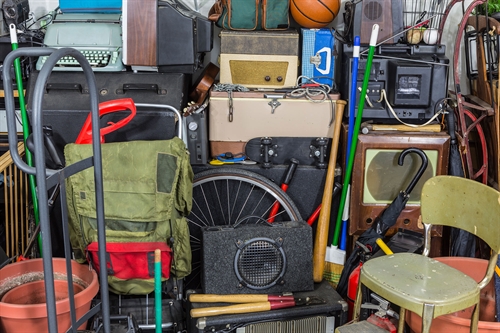Imagine a world where broken umbrellas find new life as a bony creature that signals bad weather. Or where a neglected grater sprouts a body and spines and scuttles off behind the kitchen cupboards.
These are examples of tsukumogami, which are a subset of yokai, supernatural beings that appear in Japanese folklore. In Japan there is a folk belief that any object that reaches 100 years old might obtain a spirit. But if the object has been badly treated, ignored, neglected or poorly cared for that spirit might not be very pleasant.
Possessed possessions
Some tsukumogami are downright horrifying – as well as the flying umbrellas (hone karakasa) mentioned above, neglected umbrellas can also take the form of karakasa kozō – which is a folded umbrella with a single eye and long tongue. It hops around on its handle and surprises people by giving them a large oily lick. The website Yokai.com has a picture of and more information about Karakasa kozō and the other yokai mentioned.
And there is boroboroton: a possessed futon that might try to strangle the poor person sleeping on it.
The artist Hokusai (of The Great Wave fame) drew many pictures of tsukumogami, including a chilling image of a paper lantern ghost, a chōchin obake with rolling eyes and a lolling mouth.
And then there’s kyōrinrin (or awesome sutra), a dragon that forms from neglected books and scrolls. It attacks its careless owner with its beak and extendible arms. (If this is a worry for you, check out our post on storing books ).
Merry pranksters
But there are some pleasant tsukumogami, too, though they may gang up on people who they consider to be particularly wasteful or careless with their possessions. For example, there are lots of musical instruments that play themselves, such as shami chōrō and biwa-bokuboku. And there’s the bakezōri, the ghost sandal which scampers round the house at night.
In the Japanese religion Shinto ceremonies are performed to comfort and honour broken items. For example, there is a festival once in year in which embroiderers and tailors bring all the year’s broken needles to the temple and stick them into soft foods like tofu to thank them for their service.
Shinto has in its tenets elements of animism , the belief that objects (and places and creatures) have a spiritual essence. Western philosophies and organised religions discourage a belief in animism, but worries about offending or upsetting objects do crop up in conversations about decluttering. If this is something that you experience, it can help to look at Japanese approaches to stewardship of household goods – although you probably don’t really need to worry that your grater will run away in the form of yama oroshi!
But for all sorts of reasons apart from avoiding the wrath of supernatural beings, it’s worth taking good care of household items. One way of doing this is to store them properly when they are not in use by opting for a reputable self storage company and to insure them, too – why not get a quotation from Store and Insure today ?





